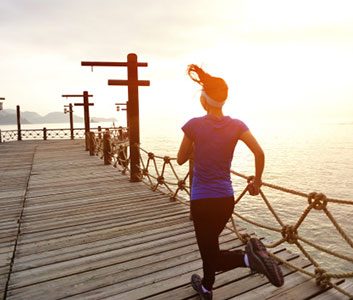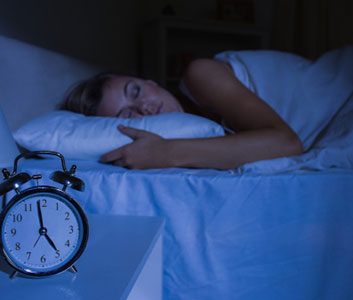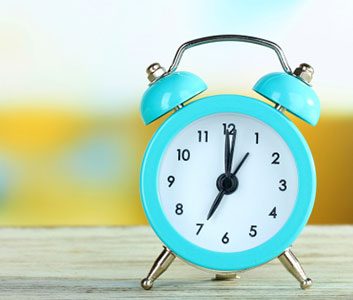
Morning
A 2013 study out of Vanderbilt University Medical Center has shown that insulin activity is controlled by the body’s circadian clock. This means that when we eat could be as important as what we eat for reducing our risk of obesity, diabetes and heart disease. The study, conducted on mice, showed that insulin’s ability to remove glucose from the blood slowed down during a fasting phase in a 24-hour cycle, and that it instead converted glucose into fat. Therefore, in order to ensure the most effective insulin action, says the study co-author Carl Johnson, a professor of biological sciences at Vanderbilt, we should eat during our active phase-6 a.m. to 8 p.m.-and resist drinking any caloric beverage or eating during our inactive phase-8 p.m. to 6 a.m. Johnson, who personally follows this rule, believes that although the study was conducted on mice, the results would be the same if applied to humans. In fact, studies on humans are currently underway.

Daytime
You’ve always suspected you caught a cold or flu after disrupting your sleep cycle (for example, after pulling that all-nighter). Now there’s proof: A study by Sassone-Corsi and colleagues has shown that maintaining the circadian clock boosts the body’s ability to fight intestinal bacteria infections. “Up to 15 percent of human genes, including those that respond to intestinal infections, are regulated by the day-night pattern,” Sassone-Corsi says. His research, looking at the salmonella pathogen, showed that the body’s immune system (which is governed by circadian-controlled genes) was better able to deal with the infectious agent in the daytime. Not only could this lead to more targeted timing for treatment of dangerous infections, but it could explain why disruptions in day-night patterns, such as travelling across time zones or doing shift work, raise our susceptibility to infectious disease, he adds.

Evening
A 2012 study in the Journal of Physiology showed that in mice, doing scheduled exercise on an exercise wheel helped counteract the negative effects of aging and disease. For some unknown reason, the animals also pumped more of a certain protein that regulates their circadian clocks post-evening exercise versus morning exercise. Of course, if you leave it too late in the evening, you may have difficulty getting to sleep. And if you like to exercise in the morning, keep doing that if it works for you.

Bedtime
Research shows that the body’s clock also impacts the way medications are metabolized. For example, blood pressure medication is better taken at bedtime because it releases during the early morning hours, when blood pressure rises quickly and there is a higher risk of heart attack. Before changing your medication routine, however, be sure to talk with your doctor, and always make sure you follow the directions on the prescription label.

Bottom line
Sassone-Corsi says the best way to preserve your body’s clock is to get regular sleep; between seven and eight hours are recommended for adults. Good sleep practices include going to bed and waking up at the same time every day, avoiding long naps, and creating a sleep routine that includes time to relax before bed. It’s also a good idea to anticipate changes. For example, you will gain an hour of sleep when clocks change from Daylight Saving Time, or will lose several hours when flying east. In each case, there are measures you can take: A few days before changing from Daylight Saving Time, delay your bedtime by a half-hour or an hour. If you are travelling east, start by going to bed earlier; if you are travelling west, delay your bedtime. While travelling, sleep on the plane if you will arrive at your destination at night. “The less you disrupt your clock, the better,” says Sassone-Corsi.
There is hope for treatments for disorders triggered by circadian dysfunction, including jet lag and chronic conditions such as depression and Parkinson’s disease. Researchers from McGill and Concordia universities recently identified how protein synthesis is controlled by the brain’s clock. “We identified a repressor protein in the clock and found that by removing it, the brain clock function was surprisingly improved,” explains Nahum Sonenberg,
Related:
• 6 tips for a good night’s sleep
• Why sleep helps you lose weight
• 6 soothing yoga poses to help you sleep
